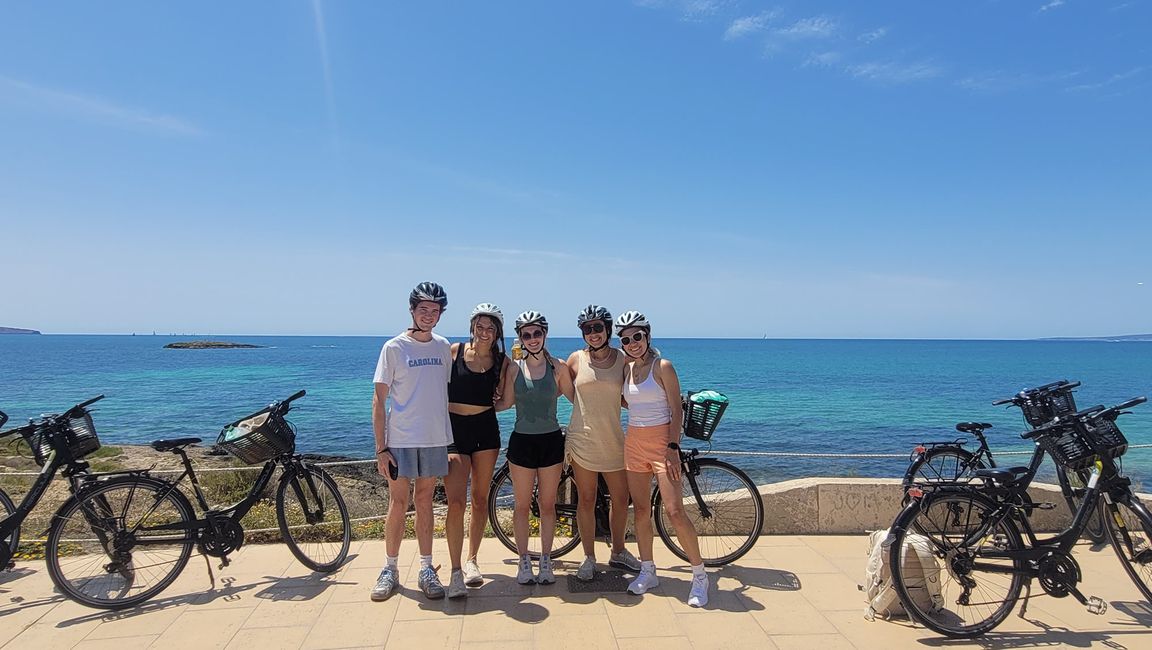10 Budgeting Hacks for First Year College Students Abroad
Studying abroad has the reputation of being expensive, but it doesn't have to be! You may be surprised to learn that the fees for a CIEE First Year Abroad program are comparable to average out-of-state tuition in the U.S.
Plus, the cost of a CIEE program covers a surprisingly large portion of your experience, including your college courses, accommodation, local cultural activities, 24/7 CIEE support and more!
Couple that with helpful budgeting tips, and you may find studying abroad similar, if not more affordable, to going to college in the U.S. Here are ten top budget hacks for saving money while studying abroad.
1. Create a Detailed Budget
One of the most practical pieces of advice for budgeting is to set a detailed budget. To do so, you'll need to carefully examine how much money you have and decide what you can afford to spend each month for the entirety of your program. Having this knowledge is essential in helping you avoid overspending and tells you how much money you can set aside for fun extras.
Creating a budget is one thing, but you must also check it often to ensure you're sticking to it. If you don’t want to do it the old-fashioned way, there are apps you can use that track how you're spending your money.
2. Eat Locally
Trying new restaurants is one of the best things to do when living abroad but eating out can quickly become expensive. One way to save is to visit locally owned restaurants. They're often more affordable than restaurants that serve international cuisine or cater to tourists and provide a more authentic experience.
Another way to save money is to set aside a budgeted amount every month specifically for restaurants. Once your monthly allowance for dining out is used, consider cooking local traditional dishes at home with your host family or fellow students!
3. Avoid Shopping for Anything but the Essentials
Shopping is another fun experience when living abroad, but when done excessively, it can really cost you. Try to limit yourself to only buying the essentials needed for your daily life. However, you'll undoubtedly find souvenirs and items you want to bring home, so it doesn’t hurt to set aside a realistic monthly allowance for shopping, too.
4. Don’t Pay Full Price for Brand New School Supplies
You can save on school supplies with some of these helpful budgeting tips for students:
- Buy used supplies: Used supplies are much more affordable and environmentally friendly than new supplies.
- Visit the local library: Many university libraries have copies of supplementary course materials available to check out.
- Use your laptop for everything: Instead of buying notebooks, pens and folders, go digital with your documents and notes.
5. Learn How to Be a Budget Traveler
When planning your first year abroad, you likely have wondered—can I travel to other countries during a first year abroad program? The short answer is yes! So long as you follow any restrictions or rules specific to your host country.
But travel can be expensive and finding that sweet spot for being able to travel to new places without breaking the bank can be a struggle.
Here are a few budget travel tips that can help you save:
- Travel with a friend: A travel buddy allows you to split expenses (and stay safe!).
- Stay in a hostel: Dorm beds are much cheaper than hotels.
- Eat local street food: Local food is almost always more affordable.
- Take ground transportation: National and international buses and trains are generally cheaper than flights.
- Visit outside of peak season: Shoulder dates see lower prices for accommodation and transportation.
6. Bank Smarter While Abroad
Banking while abroad is easier than ever, but international fees can add up quickly! Before moving abroad, it's a good idea to apply for a debit card with zero foreign transaction fees and no ATM fees. It's also recommended to open a travel credit card that allows you to earn rewards, save on international fees and have emergency funds available should you need it.
Creating a separate savings account is another smart budgeting hack. By using it as your main place to store money, you can minimize the risk of overspending. Simply transfer a set amount to your checking account each month, and you won’t spend a penny more than what you’ve budgeted.
7. Use Public Transportation, Bike, or Walk
Taxis are an expensive mode of transportation and unnecessary when most foreign countries have excellent and affordable public transportation options. Many places are also very pedestrian or bike-friendly, providing even more budget-friendly opportunities for getting around.
8. Take Advantage of Free Activities and Entertainment
From outdoor adventures, student parties hosted by your school, festivals and community events, there are plenty of ways to stay entertained for free! Other affordable activities include planning potlucks and game nights with local friends.
9. Score Discounts with Your Student I.D.
Many museums, landmarks and attractions—especially those with academic merit— offer student discounts for admission. Be sure to carry your student I.D. with you everywhere you go!
10. Utilize Clever Budget Hacks
If the above aren’t enough, there plenty of clever budget hacks that can help you save like:
- Using envelopes of cash: Paying with cash divided into spending categories is a great way to avoid overspending, as you can physically see your money dwindle.
- Trying a savings challenge: Having a goal of setting aside money every week or month makes saving more exciting.
- Using a visual spending tracker: Physically marking off goals is another great way to stay motivated to cut down on expenses!
Start Planning for Your First Year of College Abroad Now
Planning ways to save on the cost of living while studying abroad isn't the only financial preparation you can do before you go! Students can also take advantage of fundraising to help offset the costs of their First Year Abroad program.
Learn more about CIEE's First Year Abroad programs and your funding options.



